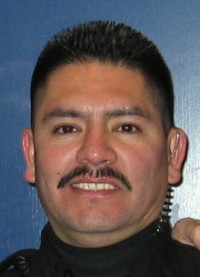Crime Victim’s Privacy Rights Tested in Cop Killer Lawsuit
The worst experience an individual can have is to answer the door and have a police officer inform you that your loved one will never come home. Unfortunately, every homicide committed involves a person receiving that terrible message at the door. The criminal justice system has done its best to ensure that the dreaded message comes as rarely as possible, but it is only in recent decades that the concept of victim’s rights has arisen. The story of Sheriff Deputy Tony Diaz presents the cause of victim’s rights in all its tragic details.
In June of 2008, Deputy Diaz was pursuing Marco Topete on Interstate Highway Five for driving under the influence. Topete’s drunk driving was aggravated by the fact that his infant daughter was in the back seat of the vehicle. During the pursuit, Topete abandoned his car and his daughter on the side of the road. When Deputy Diaz checked Topete’s car to ensure that Topete’s daughter was unharmed, Topete sneaked up on Diaz and used an assault rifle to shoot Diaz in the back. Although Deputy Diaz managed to return fire, Diaz was hit seventeen times.
 Sheriff Deputy Tony Diaz died a few hours after the shooting. Since Marco Topete had a prior criminal record, Superior Court Judge Paul Richardson approved the jury’s recommendation for a death sentence.
Sheriff Deputy Tony Diaz died a few hours after the shooting. Since Marco Topete had a prior criminal record, Superior Court Judge Paul Richardson approved the jury’s recommendation for a death sentence.
Sadly, this was not the end of the story for Tony Diaz’s sister, parents, wife and three children. The entire shooting had been recorded by the dashboard police camera in Diaz’s patrol car. The video tape had been shown at trial as evidence, although parts of the tape had been edited out. In February 2012, Sacramento KCRA-TV played the video tape on local television, including parts of the video that had not been presented at trial. The tape was shown on television without the knowledge or consent of the Diaz family. In 2013, the Diaz family sued Sacramento KCRA-TV for privacy violations, but Judge Richardson held that the tape had been part of the trial and was thus public information.
The Diaz family’s lawsuit was built on Marsy’s law, a 2008 California proposition which established a crime victim’s bill of rights. The purpose of Marsy’s law was to expand crime victim’s rights; Marsy’s law thus gives crime victims legal representation in the defendant’s trial process and the right to prevent release of confidential information.
It is these rights which prompted the Diaz family to request restriction of the police dash camera video. The video depicts the shooting which caused Officer Diaz’s death. Although privacy is currently a vague legal concept, privacy should include the right not to allow certain information to be broadcasted. Society recognizes that financial information and personal identity information should be restricted from public view. Intimate moments such as childbirth should also be shielded from the public eye. It is natural, then, that a crime victim’s death should also be kept from the mass media.
However, there are a couple of issues that swayed Judge Richardson in the other direction. First, court trials are public in order to preserve government transparency. If the government wishes to strip criminal defendants of their liberties, the public has the right to know the exact reason for their imprisonment. Second, the media has not only the right, but the duty to report on government action. Given that criminal trials are government functions, the state has no right to restrict the freedom of the press.
The Diaz family would counter that Sacramento KCRA-TV had released portions of the video now shown in court. Government transparency should not apply to information that the government did not use in its decision-making. If the Yolo Superior Court finds for the Diaz family, they would not be restricting free press, as they would only be protecting the Diaz family from unwanted exposure of Tony Diaz.
Although the Sacramento KCRA-TV portrayed Tony Diaz in the best manner possible, other crime victim’s families might not be so lucky. Rape victims especially would not want the crime aired on television, no matter what spin the media puts on the story.
I think the best way of settling this issue is to consider the wishes of the departed. Obviously Tony Diaz cannot tell the court what he wants, but the court should consider whether Tony Diaz himself would have wanted the video to be public knowledge. Diaz’s story is an inspiring one which would bring more confidence to the police force. On the other hand, Tony Diaz seems to have suffered great pain and a person’s last moments on earth are quite personal. Respecting the wishes of Deputy Tony Diaz would be a difficult standard to meet, but I think focusing on the desires of the victim would bring the most justice.


Comments